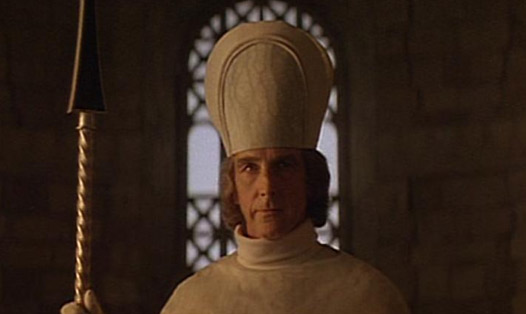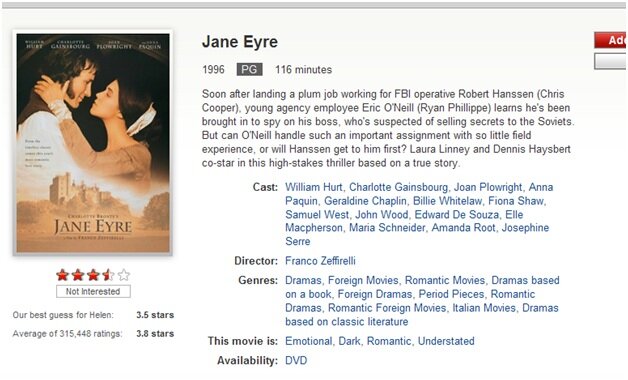What I'm Watching: Jane Eyre (1996)
I broke down the other night and watched the 1996, Franco Zeffirelli version of Jane Eyre starring William Hurt and Charlotte Gainsbourg. I've been in a girl-movie mood lately, which I am attributing in large part to a serious jones for Downton Abbey (come on, January 6th!). As I have already gone into the story behind Jane Eyre elsewhere I will spare you the storyline. Instead, I want to talk about the highlights. The lowlights. The nolights. Of this particular adaptation.[youtube=http://www.youtube.com/watch?v=EjPzjZILYuU]Sure, yes, you're probably thinking that it's hard to argue with Franco Zeffirelli, right? He's only one of the world's most renowned directors, who gave the world Romeo & Juliet and The Taming of the Shrew and the 1990 Mel Gibson Hamlet, which is quite probably the very last thing Mel Gibson did that I could stand him in before he went barking mad. But he also gave the world Endless Love and so he can make mistakes. And a mistake he has made indeed, because in all earnestness and with the full knowledge of the heft of the talent involved, I respectfully give this movie the finger.On the positive side, some of the actors look incredibly right. William Hurt as Rochester looks appropriately beaten down by life, and Charlotte Gainsbourg's Jane is quite plain and unassuming. Geraldine Chaplin plays a wonderfully repressed/slightly evil Nurse Ratched Miss Scatcherd, which I'm not sure is that much of a compliment. John Wood stands out in his performance as the squeamishly repulsive Mr. Brocklehurst, and when you look and look and look at him and wonder, where have I seen that guy before? Let me ease your mind. He was the horrible, creepy bishop in Ladyhawke who put the curse on that nice couple, Michelle Pfeiffer and Rutger Hauer. This guy: For the record, Ladyhawke had, in all likelihood, the worst soundtrack of all time. Should you choose to listen, go about a minute in for the true assault on your ears to begin. And don't say I didn't warn you.ANYWAY. Back to Jane.Some of the actors, unfortunately, were really wrong. I hated Anna Paquin as the young Jane, though I feel like that was more the fault of the direction rather having anything to do with her ability to execute a successful performance. She is supposed to be strong, yes, and outwardly "defiant", but that was due to her keenly developed sense of integrity and internal worth despite her unfortunate circumstances, not because she was busy being bratty. There were one too many eyerolls and hips cocked to one side to excuse as a momentary lapse in directorial judgment; were Jane Eyre to be set in the modern world that would have been OK but in 1840s England? Not so much. I wanted to love-hate Fiona Shaw as the horrible Aunt Reed but she was a little too over-the-top. I think she was saving up all of her dead-sibling-unwilling-guardian mojo to play Petunia Dursley in the Harry Potter series. Joan Plowright (a/k/a the Baroness Olivier) is totally wrong as Mrs. Fairfax. She's just doughy and frumpy, and normally I really like Joan Plowright. I mean, it's hard to not like Dame Joan Plowright. It's like not liking Dame Judi Dench; when her performance fails, there's a bigger problem at hand.As for the leads, William Hurt and Charlotte Gainsbourg may have looked right, but they sounded terrible. Hurt, who was amazing in A History of Violence, was really, profoundly uncomfortable with the language in Jane Eyre and couldn't make it his own. The famous, "I have a string tied here under my left rib where my heart is, tightly knotted to you in a similar fashion" speech, which is usually girl-movie-swoon-worthy, gave my skin the crawlies. And Charlotte Gainsbourg was kind of Europe's "It Girl" at the time, having won Cesar awards (basically, the French Oscar) as "Most Promising Actress" and "Best Supporting Actress" before being cast as Jane. But she was raised in Paris and had a residual French accent that would not let itself be entirely masked. It would resurface every so often, most notably during emotion-laden scenes. Was nobody listening? Didn't anyone pay attention? It. Made. Me. Crazy.I think the aforementioned bigger problem was this: the production team chose star power over propriety of casting or cohesive storytelling, or adherence to the book. The fire at Thornfield starts while Jane is leaving? What? Young Jane gets her hair cut with Helen in defiance of Mr. Brocklehurst? What? St. John is her aunt's pastor and not a distant relative, AND only has one sister? What? And so on, and so on. I know it's a complicated story. I understand when movies have to make allowances of time, or short-change one aspect of a story; the Orson Welles version of Jane Eyre, for example, completely jettisons the St. John part of the story. But it does so in order to spend time with the rest of the story, which then compensates for what's missing. This version just hammers through everything--it rushes her time at Lowood, it rushes through her romance with Rochester, it rushes through her final meeting with Aunt Reed, through her entire year with St. John, through her return to Rochester. And as the final kicker, when she returns to Thornfield she doesn't even do so because she mystically hears Rochester calling to her soul through space and time; instead, she moseys on back because she doesn't want to marry St. John.Whatev. Way to kill the idea of being tied together at the core of their beings. If you need to watch it, make sure you've got knitting handy to keep yourself occupied. OR, dial it up to stream and watch John Wood's performance, and then call it a day. If you want to watch Jane Eyre and can only ever devote two hours to it, watch the Orson Welles 1943 version. If you can spare four hours, go for Toby Stephens and Ruth Wilson (2006). But this one? No.Unless you get a chance to watch this very special interpretation of the William Hurt-Charlotte Gainsbourg Jane Eyre, which is still my favorite Netflix error of all time.
For the record, Ladyhawke had, in all likelihood, the worst soundtrack of all time. Should you choose to listen, go about a minute in for the true assault on your ears to begin. And don't say I didn't warn you.ANYWAY. Back to Jane.Some of the actors, unfortunately, were really wrong. I hated Anna Paquin as the young Jane, though I feel like that was more the fault of the direction rather having anything to do with her ability to execute a successful performance. She is supposed to be strong, yes, and outwardly "defiant", but that was due to her keenly developed sense of integrity and internal worth despite her unfortunate circumstances, not because she was busy being bratty. There were one too many eyerolls and hips cocked to one side to excuse as a momentary lapse in directorial judgment; were Jane Eyre to be set in the modern world that would have been OK but in 1840s England? Not so much. I wanted to love-hate Fiona Shaw as the horrible Aunt Reed but she was a little too over-the-top. I think she was saving up all of her dead-sibling-unwilling-guardian mojo to play Petunia Dursley in the Harry Potter series. Joan Plowright (a/k/a the Baroness Olivier) is totally wrong as Mrs. Fairfax. She's just doughy and frumpy, and normally I really like Joan Plowright. I mean, it's hard to not like Dame Joan Plowright. It's like not liking Dame Judi Dench; when her performance fails, there's a bigger problem at hand.As for the leads, William Hurt and Charlotte Gainsbourg may have looked right, but they sounded terrible. Hurt, who was amazing in A History of Violence, was really, profoundly uncomfortable with the language in Jane Eyre and couldn't make it his own. The famous, "I have a string tied here under my left rib where my heart is, tightly knotted to you in a similar fashion" speech, which is usually girl-movie-swoon-worthy, gave my skin the crawlies. And Charlotte Gainsbourg was kind of Europe's "It Girl" at the time, having won Cesar awards (basically, the French Oscar) as "Most Promising Actress" and "Best Supporting Actress" before being cast as Jane. But she was raised in Paris and had a residual French accent that would not let itself be entirely masked. It would resurface every so often, most notably during emotion-laden scenes. Was nobody listening? Didn't anyone pay attention? It. Made. Me. Crazy.I think the aforementioned bigger problem was this: the production team chose star power over propriety of casting or cohesive storytelling, or adherence to the book. The fire at Thornfield starts while Jane is leaving? What? Young Jane gets her hair cut with Helen in defiance of Mr. Brocklehurst? What? St. John is her aunt's pastor and not a distant relative, AND only has one sister? What? And so on, and so on. I know it's a complicated story. I understand when movies have to make allowances of time, or short-change one aspect of a story; the Orson Welles version of Jane Eyre, for example, completely jettisons the St. John part of the story. But it does so in order to spend time with the rest of the story, which then compensates for what's missing. This version just hammers through everything--it rushes her time at Lowood, it rushes through her romance with Rochester, it rushes through her final meeting with Aunt Reed, through her entire year with St. John, through her return to Rochester. And as the final kicker, when she returns to Thornfield she doesn't even do so because she mystically hears Rochester calling to her soul through space and time; instead, she moseys on back because she doesn't want to marry St. John.Whatev. Way to kill the idea of being tied together at the core of their beings. If you need to watch it, make sure you've got knitting handy to keep yourself occupied. OR, dial it up to stream and watch John Wood's performance, and then call it a day. If you want to watch Jane Eyre and can only ever devote two hours to it, watch the Orson Welles 1943 version. If you can spare four hours, go for Toby Stephens and Ruth Wilson (2006). But this one? No.Unless you get a chance to watch this very special interpretation of the William Hurt-Charlotte Gainsbourg Jane Eyre, which is still my favorite Netflix error of all time.